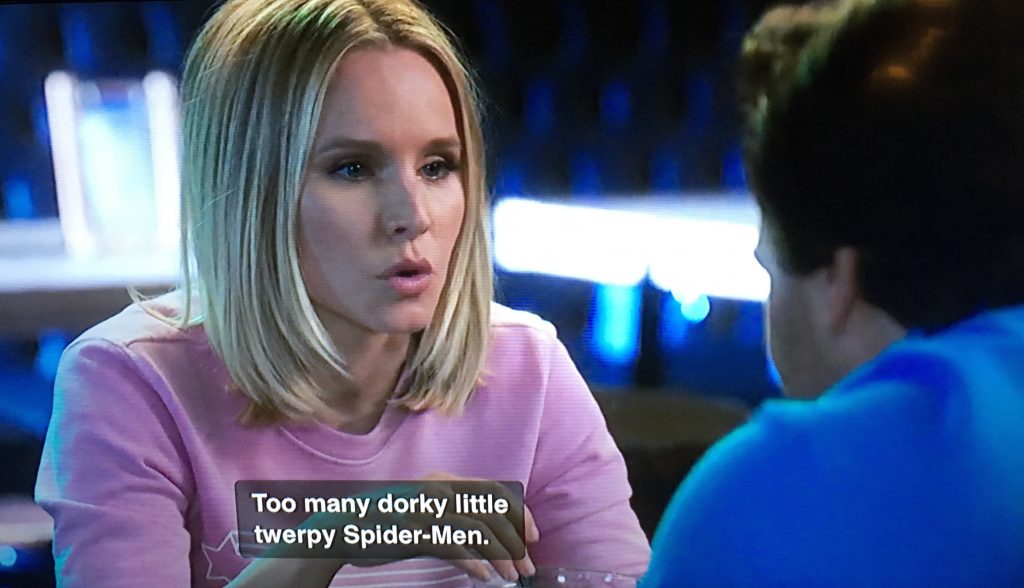
Spider-Man has been a constant in media for as long as I can remember. Growing up, I watched Spider-Man (1994-1998) and (to a lesser degree) Spider-Man Unlimited (1999-2001), the Raimi series starring Tobey Maguire (2002, 2004, 2007) and the semi-related Spider-Man: The New Animated Series (2003) which starred Neil Patrick Harris (BRILLIANT casting, btw). Since then, there’s been a semi constant stream of animated series and live action films: The Spectacular Spider-Man (2008-2009), Ultimate Spider-Man (2012-2017), Spider-Man (2017-present), Andrew Garfield’s The Amazing Spider-Man (2012) and The Amazing Spider-Man 2 (2014), Tom Holland’s appearances in the MCU (Captain America: Civil War (2016), Spider-Man: Homecoming (2017), and Avengers: Infinity War (2018), and the anticipated Avengers: Endgame (2019) and Spider-Man: Far From Home (2019)) and, of course, Spider-Man: Into the Spider-Verse (2018).
Tl;dr: Spider-Man has been on TV or in theaters consistently since 1994. My brother will tell you that’s almost 25 years.
And that’s not even talking syndication or getting into the media produced prior to 1994.
So, what about the Spider-Man property makes it appeal to so many? What has made the Spider-Man character such a fixture in pop culture, often listed as the archetypal superhero beside Batman and Superman?
The original Spider-Man is Peter Parker, a high school student from Queens, New York. He’s an avid photographer who is also considered a science nerd and is often bullied as a result. After being bitten by a ‘radioactive’ spider, he gains spider powers, including the ability to walk on walls and increased strength, agility, and senses. After taking up the mantle of Spider-Man, he must balance being a normal teenager with being a superhero.
I think that Spider-Man’s continued popularity comes from his continued cross-generational relate-ability.
Being a teenager is something we can all relate to. Humans biologically go through a change from childhood to adulthood and during this time, teenagers feel like they are different, isolated, all while struggling between the joyous irresponsibility of childhood and the desire to be seen as an adult. Peter Parker and Spider-Man have long been able to tap into and/or recapture these feelings.
For example, let’s start with the name Spider-Man. When Spider-Man was created, teenage superheroes were typically given names that ended with ‘Boy’. While Stan Lee had his own reasons for choosing Spider-Man over Spider-Boy, I think the name resonates now for different reasons. It’s a demonstration of Peter Parker’s desire to be seen as an adult and given responsibilities. That he is not an adult comes into play in a number of different ways, but that he wants to be treated like a grown up is something all teenagers experience.
The other thing about being a teenager is that everything feels very urgent and very dramatic and very important. This is due to different reasons, the changing brain chemistry, the new/increased responsibilities, etc. The point is, it tends to be memorable period of time as a result. During the struggle for increased independence and the quest to find an identity, it’s easy to feel isolated, like no one else feels the way you do, or could possibly understand. The strong desire for more new responsibilities and freedoms results in feelings of helplessness and a desire for control that teenagers think adults possess. (We don’t, btw. We just learn to live with it.) Spider-Man’s decision to present himself as an adult reflects this desire, as well as his attempts to take control using the powers he now possess– something every teenager wishes they could do as they come to realize the amount of control their parents have over their life.
Peter Parker is an outsider at school who has the ability to take control of his circumstances and how he is seen by others when he becomes Spider-Man. I can guarantee that it doesn’t matter how ‘popular’ you were in high school, you absolutely felt like no one understood you, that you were weird and different from everyone else, that you wished you could take control and make changes.
While Batman and Superman were adults with additional freedoms and powers, teenage Peter Parker/Spider-Man has some strong limitations. Because of his age, there are people constantly watching out for him including teachers, friends, and family. He can’t just call in sick or not come home when there are rules and expectations in place. Spider-Man has to find a way to balance his normal life and his superhero life with more variables than the adults. In recent years, this has become increasingly relatable as high school students wishing to go to college are expected to have a laundry list of extracurriculars and special skills, all while trying to connect socially and do well academically.
In recent years, this has become increasingly relatable as high school students wishing to go to college are expected to have a laundry list of extracurriculars and special skills, all while trying to connect socially and do well academically. But, even older generations can relate to that feeling of having to constantly report back to someone.
Essentially, Spider-Man is the ultimate teenage fantasy– what we all wish we could be. He is free and powerful all in between schoolwork and other responsibilities. This is why the character never seems to leave our screens for long. And, with castings such as Tom Holland and new takes such as Spider-Verse, it’s easy to want more.
